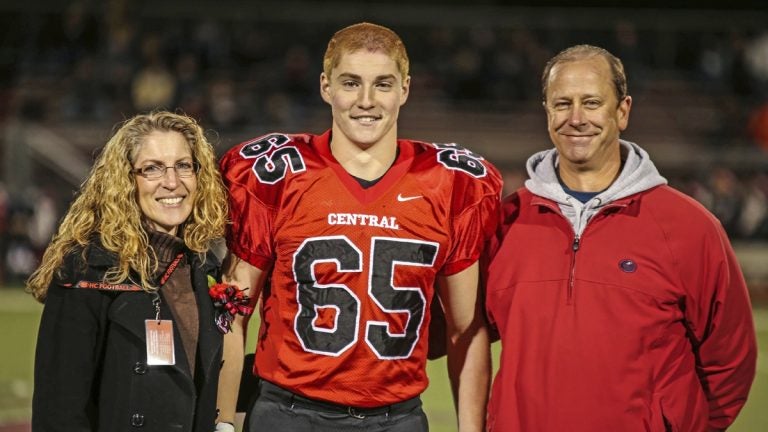Judge tosses most serious charges in Penn State frat death

This Oct. 31, 2014, photo provided by Patrick Carns shows Timothy Piazza, (center), with his parents Evelyn and James Piazza, during Hunterdon Central Regional High School football's 'Senior Night' at the high school's stadium in Flemington, N.J. (Patrick Carns via AP)
A judge on Friday threw out involuntary manslaughter and felony assault counts filed against members of a Penn State fraternity in a pledge’s alcohol hazing-related death, ordering 12 of the frat brothers to stand trial on lesser counts.
District Justice Allen Sinclair dismissed charges altogether against four of the members of the now-shuttered Beta Theta Pi fraternity. Fourteen fraternity brothers are now headed to trial in the case. Two had previously agreed to waive a preliminary hearing.
Charges remaining range from alcohol violations and hazing to reckless endangerment.
“Obviously now the teeth have really been taken out of the commonwealth’s case,” defense attorney Michael Engle said.
The decision followed a hard-fought, unusually long, seven-day preliminary hearing in which the defendants and a platoon of defense attorneys wedged into the courtroom fought against allegations that a night of hazing and heavy drinking caused the death of Tim Piazza on Feb. 4.
Centre County District Attorney Stacy Parks Miller had argued that members of the fraternity pressured Piazza and other pledges to drink heavily, plying them with wine, vodka and beer after a ceremony to mark their decision to pledge the organization.
That pressure included running them through a speed-drinking “gantlet” and directing them to collectively drain a large bottle of vodka.
The security video recorded Piazza, a 19-year-old sophomore engineering student from Lebanon, New Jersey, appearing intoxicated and being led to a couch after 11 p.m. A few minutes later, he fell head-first down a set of basement stairs and had to be carried back up in an unconscious state.
For several hours members of the fraternity appeared to take half-hearted and even counterproductive measures to tend to their injured friend, pouring liquid on him and strapping on a loaded backpack to prevent him from rolling over and choking on vomit.
In the early morning hours, Piazza was pictured stumbling from the couch to other areas on the vast house’s first floor, including falls into a door and onto a stone floor.
He somehow ended up back in the basement the next morning and was again carried back upstairs to a couch. It took another 40 minutes for fraternity members to call an ambulance.
Authorities said Piazza had ingested a dangerous amount of alcohol and suffered severe head and abdominal injuries. He soon died at a hospital.
Defense attorneys argued that their clients’ roles were minimal or their actions did not amount to criminal behavior. They argued the students had little reason to anticipate tragic results from a night that also included an alcohol-fueled social mixer with a sorority group.
“Yes, there’s excessive drinking on college campuses,” defense attorney Theodore Simon said Thursday. “That does not transform it into criminal behavior.”
Parks Miller said many of the defense arguments would be more suitable for a jury to consider. She disputed a suggestion that defendants would not have known of the danger because no one had died during the fraternity chapter’s long history.
“As far as this idea, ‘Well, nobody died before,’ do they really think they get a free death before someone is held responsible?” Parks Miller told the judge.
Engle argued that “the voluntariness of the drinking” is an important factor when considering Piazza’s fate.
“What we have is evidence from this record that this tragic death was simply not foreseeable here,” Engle said.
He challenged Parks Miller’s approach to charging the men as accomplices, arguing that would require a principal actor that was not established.
“You’ve heard over and over again, all of these individuals are accomplices, but as a matter of law, these individuals can’t be accomplices with one another,” he told the judge.
Parks Miller said the speed-drinking gauntlet was designed by the group “for maximum devastation.”
WHYY is your source for fact-based, in-depth journalism and information. As a nonprofit organization, we rely on financial support from readers like you. Please give today.




